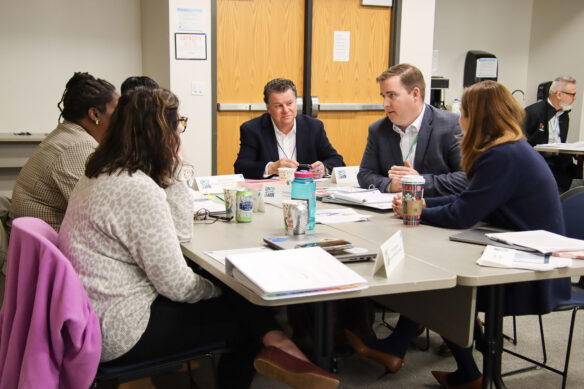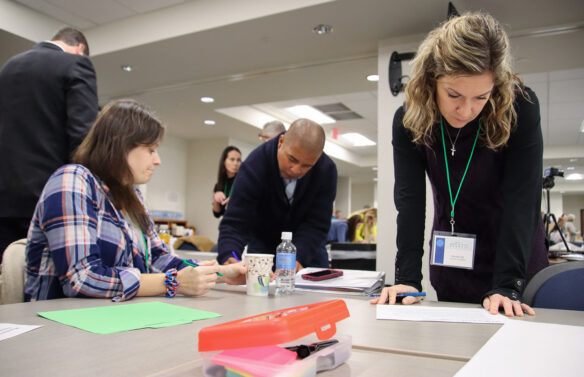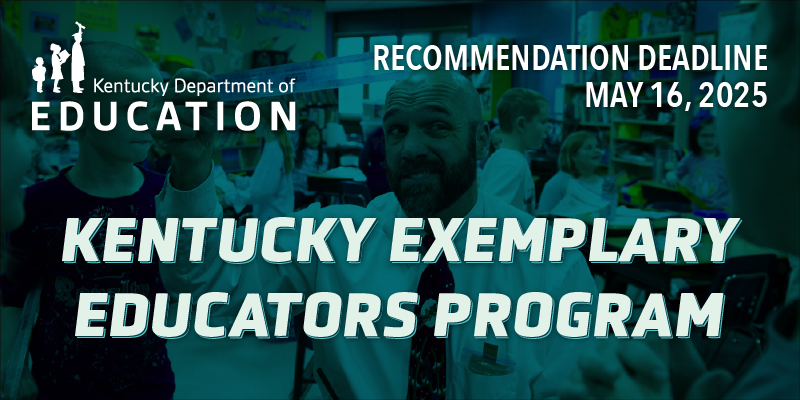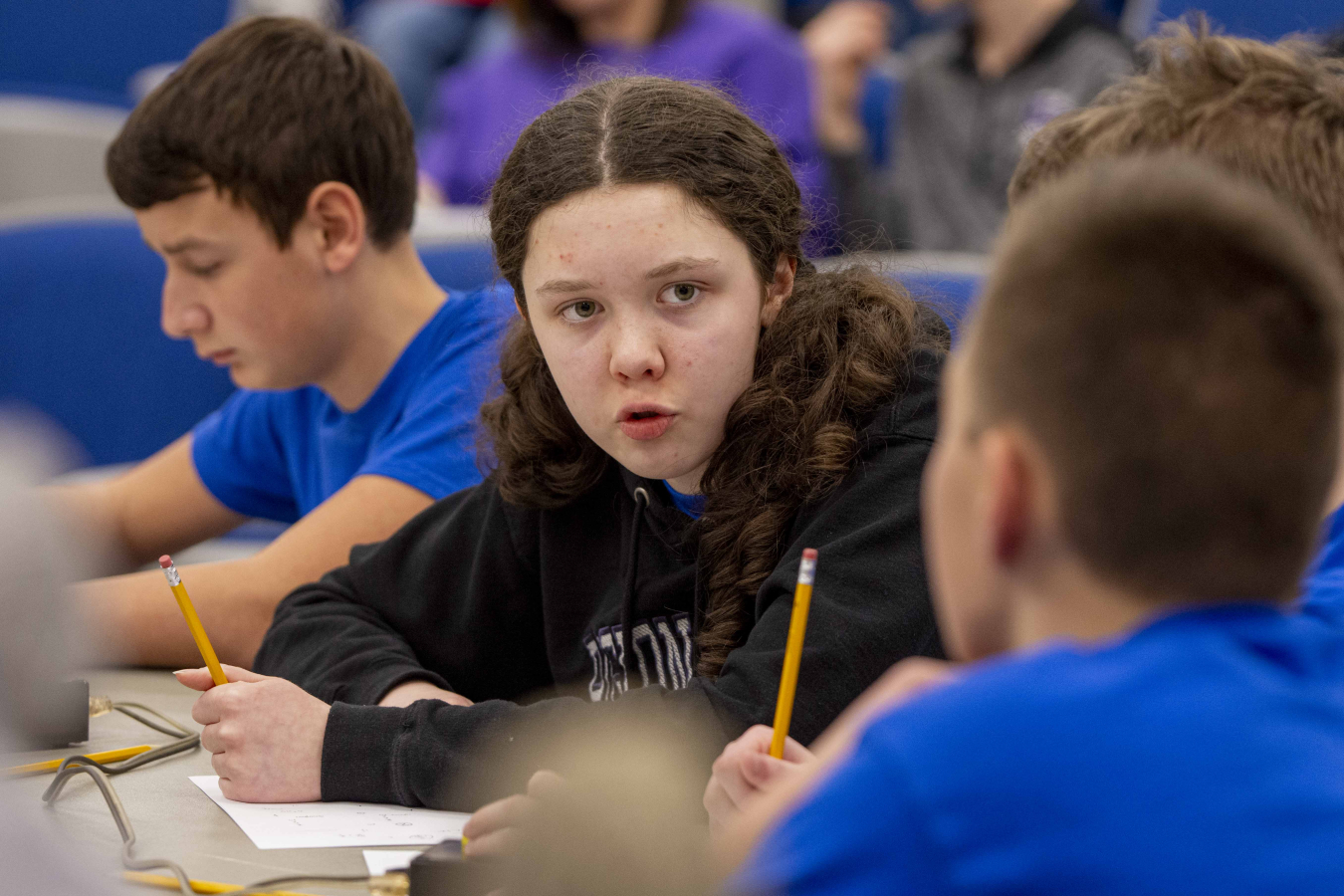
Members of the Kentucky United We Learn Council discuss the council’s work so far and its goals for the future during the council’s fall convening.
Photo by Joe Ragusa, Nov. 2, 2023
The Kentucky Department of Education’s (KDE’s) Kentucky United We Learn Council met for its regular fall convening on Nov. 2-3.
The council is tasked with recommending strategic practice, policy and investment ideas that advance Kentucky’s United We Learn vision of creating a more vibrant experience for every student, encouraging innovation in schools – especially when it comes to assessment – and creating a bold new future for the Commonwealth’s schools through collaboration with communities. The council itself is made up of educators, community members, families and students.
The first day kicked off with remarks from Interim Commissioner of Education Robin Fields Kinney and Kentucky Board of Education (KBE) Chair Sharon Porter Robinson and Vice Chair Lu S. Young.
Kinney, who took over as interim commissioner on Sept. 30, provided the council with an update on her first month as interim commissioner, and stressed her support of the council’s efforts.
“I’m very supportive of your work. I encourage your work,” she said. “And when we get to the next commissioner, once that happens, we will hand off your work and we will keep on going.”
Young tasked the council with finding a “moonshot” when it comes to how education in Kentucky can evolve, much like a mission statement where the moonshot serves as the council’s main goal.
“We have set our sights on meeting the full spectrum of needs of every Kentucky learner and every educator in every school in the Commonwealth,” said Young. “Raising achievement for all learners and closing gaps among student groups while intentionally engaging communities in fulfilling the ultimate promise of public schools in their own backyards.”
During the meeting, the council focused on what that moonshot might look like.
“We’ve been talking about the moonshot for the last year, and today we’re really going to nail that down and make sure that we’re all on the same page so that we can do the best work going forward,” said Audrey Gilbert, a freshman at Bellarmine University and chair of the Kentucky United We Learn Council. Gilbert was elected by the council as a high school senior and provides a student’s perspective.
Young said Kentucky’s Local Laboratories of Learning (L3s) have been helping drive the United We Learn Council’s work, and many had representatives in attendance at the council’s meeting.
KDE and the Center for Innovation in Education partnered to establish three L3 cohorts, which have been involved in the design of a new assessment and accountability system in Kentucky. These community-based partnerships aim to create a system of assessment and accountability that reflects the diversity of the students and families and communities the L3s represent.
“The early design of our ultimate moonshot involves lots of prototyping to determine how vibrant learning, innovation and deep community engagement look and feel in real schools and districts across the Commonwealth,” said Young. “Without the designs that the L3 districts are providing us as the early engineers did for NASA, we would have never landed on the moon.”
Robinson shared the KBE’s “road ahead,” captured in the board’s Call to Action document which aligns with the United We Learn Council’s efforts. Proposed next steps include championing the implementation of locally developed Portraits of a Learner, promoting professional learning designed to support vibrant learning experiences, and eventually proposing a reimagined accountability system to lawmakers.
“We respect that if it’s going to get done at all, the voice of demand has to be informed and cultivated at the level of folks who know best, who see it first, who know if it’s working or not, and that’s you,” said Robinson.
Following updates from the three United We Learn Council standing committees – Bold New Future, Accelerating Innovation and Vibrant Learning Experiences – the full council participated in an activity where members mapped out the council’s progress and noted the positives and challenges so far. The council and its standing committees have worked for months collecting data and input from a variety of different stakeholder groups.
“Every product improves with deeper, richer engagement of a broader and more diverse set of stakeholders,” said Doannie Tran with the Center for Innovation in Education. “But if they’re not there, we get stymied in the progress that we try to make.”

Kentucky United We Learn Council members (from left to right) Jessica Jenkins, Damien Sweeney and Brooke Gill work through a journey mapping activity during the first day of the council’s fall meeting.
Photo by Joe Ragusa, Nov. 2, 2023
The work culminated in discussion on the actual moonshot the United We Learn Council is working toward, and on several other areas of the United We Learn vision.
The United We Learn Council leadership team will gather the feedback received on the draft moonshot statement and propose amendments to incorporate the suggested changes for council members to consider for formal adoption.
“I do feel energized about what we’re doing,” said Gilbert. “I have renewed confidence over this year that we are on the right path, that I think we’re going to do the best we can.”
The standing committees will continue meeting periodically to work ahead of the next full council meeting in the spring of 2024.




Leave A Comment